Elon Musk's X breaks records after Trump interview and UK riots, but does it have a fake news problem?
Unrest has swept across England and Northern Ireland in the days after the killing of three young girls at a Taylor Swift-themed dance class in Southport, with misinformation about the identity of the perpetrator spreading quickly on X. Elon Musk, who bought the social network for $44bn two years ago, has been vocal throughout the disorder, challenging the UK Prime Minister multiple times
Focus on free speech has led to record downloads for X ...but does Elon Musk's regime clash with the Online Safety Act passed by the last UK Government?
- Usage of X was down 18% year-on-year back in February
- Elon Musk paid £35 billion to take Twitter private in late 2022
- Advertisers fled the platform and usage started to drop
- But recent events have triggered a surge of interest in X
- Social network has topped charts in the UK and United States
- Donal Trump interview was streamed by 1.3 million users
- Musk says X just peaked with all-time record download count
- Experts suggest some of the activity on X falls foul of UK legislation
Don't Miss
Most Read
Trending on GB News
Downloads of X have reached an all-time high, according to owner Elon Musk.
That might not be wholly surprising since this social network, acquired by Elon Musk for $44 billion (£35bn) two years ago, has been at the centre of the most important events of the last fortnight.
First, unrest spread across England and Northern Ireland earlier this month, following the violent killing of three young girls at a Taylor Swift-themed dance class in Southport on July 29. Posts accusing the attacker of being a Muslim asylum seeker who recently crossed the Channel in a small boat spread on X within minutes.
𝕏 app downloads reach all-time high! https://t.co/RkTgcKwxfc
— Elon Musk (@elonmusk) August 13, 2024
In the fallout of the disorder in towns and cities throughout the country, X owner Elon Musk took UK Prime Minister Keir Starmer to task with the hashtag #TwoTierKeir – a reference to the widespread theory that police treat some groups more harshly than others, and posted: “Support freedom of speech in the UK!”
The 53-year-old businessman also proclaimed "civil war is inevitable" in the UK, sharing — and then deleting — a fake Daily Telegraph article about rioters being shipped off to "emergency detainment camps" built on the Falklands Islands, and criticising the decision to police social media by comparing the UK to the Soviet Union.
The riots saw 156 police officers injuried, including 71 rushed to hospital, and over 1,000 arrests.

UK’s Online Safety Act, which passed into law last year but is yet to come into full effect, could see the biggest online platforms face fines of up to £18 million if they're found to break the rules
GETTY IMAGES
With the unrest dying down, the next influx of interest came from Republican presidential candidate Donald J. Trump, who sat down for an exclusive two-hour conversation with X owner Elon Musk on the social network.
Musk, who has endorsed Trump, lauded the 45th President of the United States for his bravery during the attempt on his life last month. Meanwhile, Trump congratulated Musk for his willingness to fire workers who threatened to strike at his companies.
If Elon Musk's goal was to drive attention to his social network — it's worked.
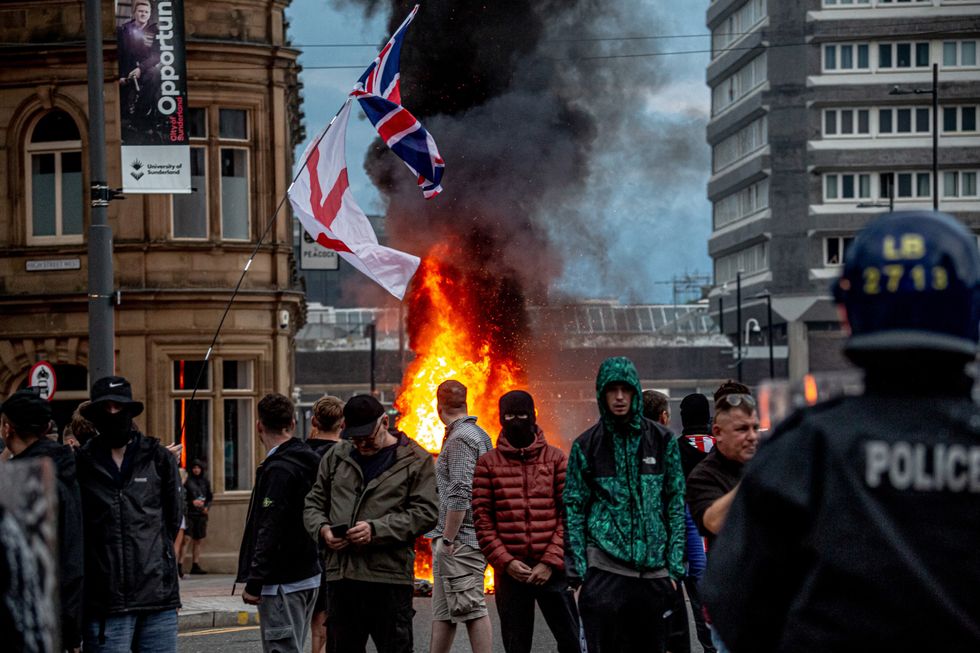
According to the latest statistics, at least 156 police officers have been injured across the UK so far, with 71 taken to hospital
GETTY IMAGES
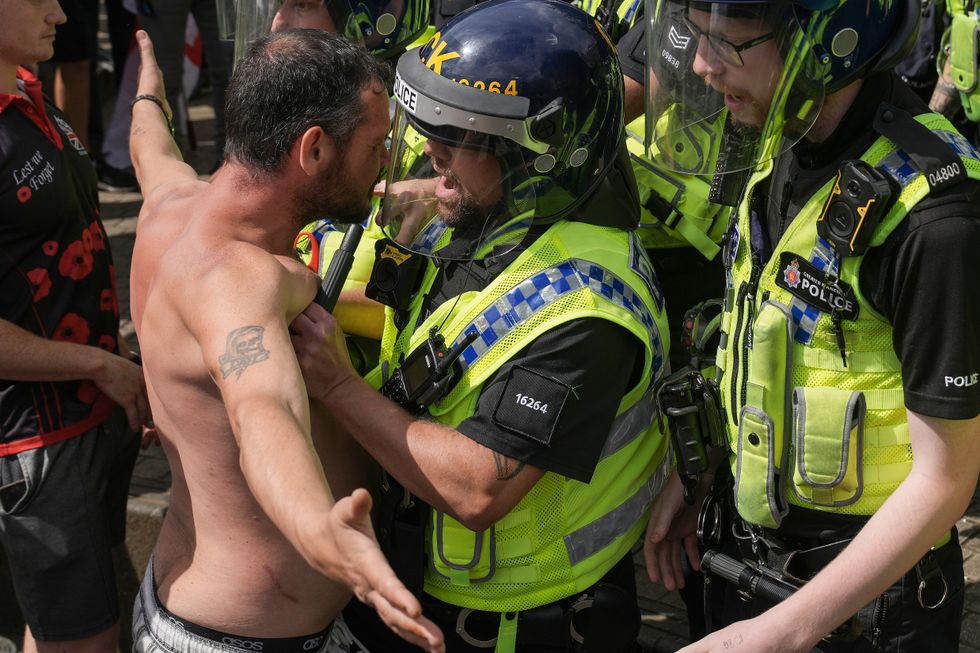
Police officers were dispatched across the UK to deal with the unrest. With rumours swirling of widespread protests, some 6,000 police officers were called-up on August 7
GETTY IMAGES
A counter on X showed as many as 1.3 million people were listening at times during the lengthy conversation.
And now, Elon Musk has celebrated record downloads for his social media service.
At the time of writing, X is the most popular app in the "News" category in the UK in the Apple App Store, and it's the second most downloaded in the "Social Network" category on the Google Play Store, which is the main repository for applications on Android phones and tablets. Musk himself shared this achievement, responding to a post on X about the surge in downloads and adding: "🇬🇧 Top source of news in the UK 🇬🇧"
These impressive stats represent a dramatic turnaround for X.
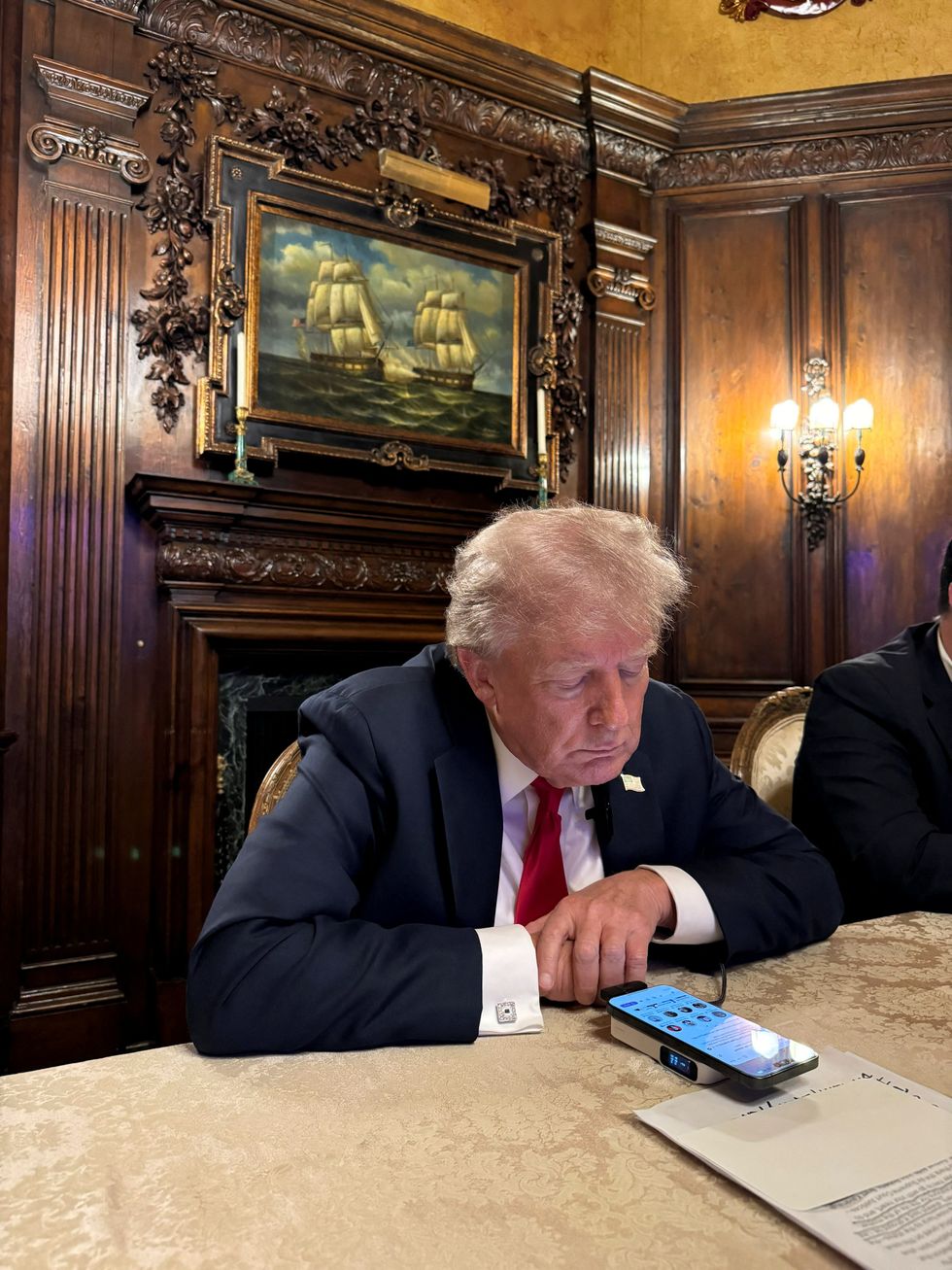
Republican presidential nominee Donald Trump speaks as he participates in an interview with billionaire entrepreneur Elon Musk on the social media platform X, at Mar-a-Lago in Palm Beach, Florida
REUTERS
Back in February, the social network boasted 27 million daily active users in the United States — a drop of 18% year-on-year, according to data published by Sensor Tower, a market intelligence firm based in San Francisco.
The events of the last fortnight have renewed interest in the social network, which competes directly with Threads — a copycat service launched by Instagram, which is owned by Meta, and BlueSky — a decentralised social experienced created by former Twitter CEO Jack Dorsey.
But there questions remain about Elon Musk's ability to police his platform for disinformation and whether this free speech mentality runs counter to the Online Safety Act passed by the last UK Government.
Usage of this platform reached another all-time high https://t.co/vyDsseq1IP
— Elon Musk (@elonmusk) August 8, 2024
Elon Musk has talked openly about ambitions to overhaul X into an “everything app” similar to WeChat, has dramatically cut staff numbers during his tenure, including all content moderators who worked at the social network — replacing their role with a crowd-sourced Community Notes feature.
He also dissolved the Trust and Safety Council, the independent advisory group of some 100 independent civil, human rights, and other organizations that were put together in 2016 to address problems around hate speech, child exploitation, suicide, and other problematic content spreading on the platform.
Musk also overhauled the social network’s verification regime, enabling anyone to pay for the iconic blue tick. Until then, the badge was only bestowed on prominent public figures, celebrities, journalists, businesses, and government agencies to signal their identity had been checked by the teams within Twitter.
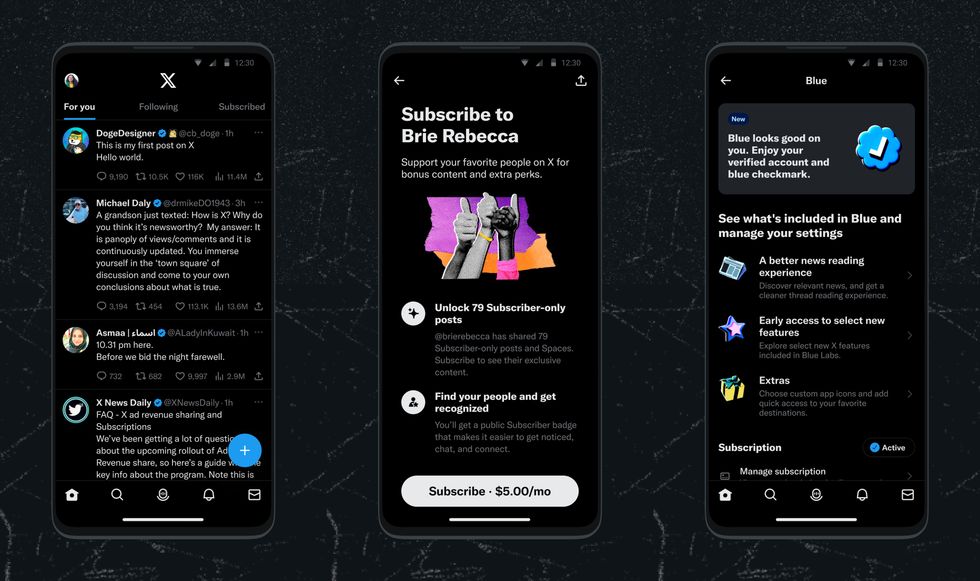 X offers three subscription tiers, known as Basic, Premium, and Premium+. These unlock a number of extras, like a blue verified checkmark and improved news reading ...but using the core features of the social network remains free for now X
X offers three subscription tiers, known as Basic, Premium, and Premium+. These unlock a number of extras, like a blue verified checkmark and improved news reading ...but using the core features of the social network remains free for now X And lastly, the multi-billionaire restored the accounts of several high-profile figures previously banned for breaking site rules around hate speech, including Tommy Robinson – real name Stephen Yaxley-Lennon, Katie Hopkins, and Donald J Trump. According to Musk, the decision was taken to allow "absolute free speech".
Each of these decisions in the wake of the acquisition of Twitter in October 2022 was put under the spotlight in the wake of the widespread riots, counter-protests, and criminal damage across towns and cities in the UK.
McAfee Head of EMEA Vonny Gamot told GB News: "Social media platforms like X are often the most common place for internet users to encounter disinformation and fake news. As you might expect, these platforms have large user bases which allow for the rapid spread of information, both accurate and inaccurate.
“Much of this disinformation is consumed passively as people scroll through reams of content, so it’s often absorbed and accepted without meaningful interrogation. I think the increase in disinformation that we’re seeing is quite simply down to the ease of sharing content online.
"Social media channels — like X — are all incredibly accessible and easy to use, and they allow information whether accurate or not, to be spread to a global audience, fast.
"Recent advances in AI have also created an environment where fake news can be created and distributed even more rapidly, and it’s getting harder and harder to discern what’s real and what isn’t.
"In fact, a McAfee study found that just 1 in 5 Brits find it easy to spot AI-generated content such as fake news and scams on social media. Combatting disinformation requires a concerted effort from individuals, media organisations, tech companies, and governments to promote media literacy, fact-checking, transparency, and responsible information sharing.
“What's most important is that consumers are armed with the capabilities to tell fact from fiction, and that they themselves take a moment to pause and verify information before sharing anything online.”
Speaking to GB News, Fellow of BCS, The Chartered Institute for IT, Adam Leon Smith cautioned: "There's got to be a tipping point where a foreign billionaire platform owner needs to take some responsibility for running a toxic bot network that has become one of the main sources of fake news in the UK.
"When misinformation leads to riots and unrest, there must be consequences. It is easy to argue that X has shown disregard for public safety in hosting such content.
"We urge Ofcom to enforce the Online Safety Act as soon as they can, with the full weight of the law and levy significant fines if they find mismanagement on the platform. Elon Musk’s firing of 80% of the engineers working on trust and safety has proven to be a gamble that has not paid off."
The UK’s Online Safety Act, which passed into law last year but is yet to come into full effect, could see the biggest online platforms face fines of up to £18 million or 10% of qualifying worldwide revenue, whichever is greater if they do not comply with the new rules. Named managers could be looking at criminal liability too, meaning Chairman Elon Musk and CEO Linda Yaccarino could be in the cross-hairs.
Rashik Parmar MBE, CEO of BCS, The Chartered Institute for IT, added: "The digital age has brought unparalleled access to information, but it has also enabled the spread of dangerous misinformation. Despite the escalating threat, online safety teams are grappling with reduced budgets, limiting their ability to respond.
"Social media giants must commit to providing these teams with the resources to address the misinformation crisis, and show the public they can prioritise ethics and accountability."
Michelle Donelan, a former Conservative MP who worked on the Online Safety Act when she was technology secretary, has called for Prime Minister Keir Starmer to engage with social media platforms.
She told GB News: “I don’t think he’ll do anything in relation to social media. We’ve done the Online Safety Act, which is the most comprehensive Bill in this space in the world."
Downing Street had previously criticised Elon Musk for tweeting that "civil war is inevitable" in the UK, with Sir Keir’s official spokesman saying that there was "no justification for comments like that."
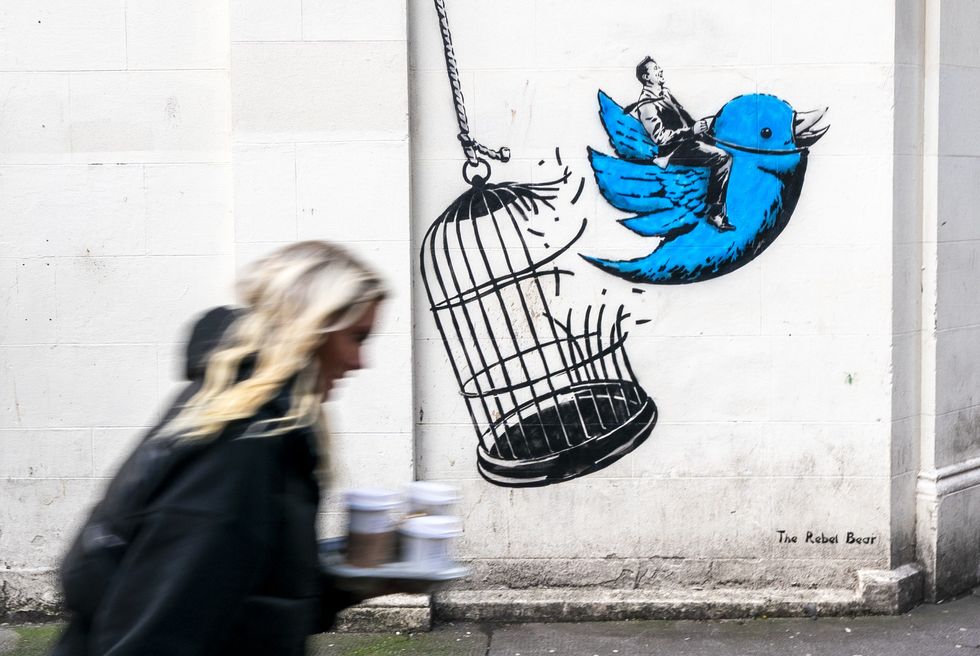
Street art by the artist known as Rebel Bear that features Elon Musk and references his take-over of social media platform Twitter. The graffiti appeared in Edinburgh city centre last year
PRESS ASSOCIATION
Under Elon Musk, X has shifted its emphasis from a chronological ranking to one driven by an algorithm.
Posts under the algorithm-driven For You tab are ranked based on several factors, including posts with the highest levels of engagement on the platform and whether or not someone subscribes to one of its paid plans, since this promises to feature content more prominently across the social network.
Pat de Brun, Deputy Director of Technology at Amnesty International, blames this shift on the spread of disinformation. He said: "In the UK, the racist violence that has spilled across the streets follows a period of intense scapegoating of refugees and migrants by politicians and others, through dangerous rhetoric and policies.
"In this context, social media algorithms have actively amplified and escalated xenophobic discourse. These toxic algorithms are deliberately designed to prioritise engagement above all else. As a result, they act as incendiaries that fuel division, disinformation and hate."
Tips from Head of Europe at online security firm McAfee to avoid misinformation...
- Verify sources before sharing information — use fact-checking tools and reputable news sources to validate information before passing it along to your friends and family
- Be cautious of distorted images — fabricated images and videos aren’t perfect. If you look closely, you can often spot the difference between real and fake. For example, AI-created art often adds extra fingers or creates faces that look blurry
- Listen for robotic voices — AI voices often make awkward pauses, clip words short or put unnatural emphasis in the wrong places
- Keep an eye out for emotionally charged content — if you see a post or “news report” that makes you incredibly angry or very sad, step away. Much like phishing emails that urge readers to act without thinking, fake news reports stir up a frenzy to sway your thinking








